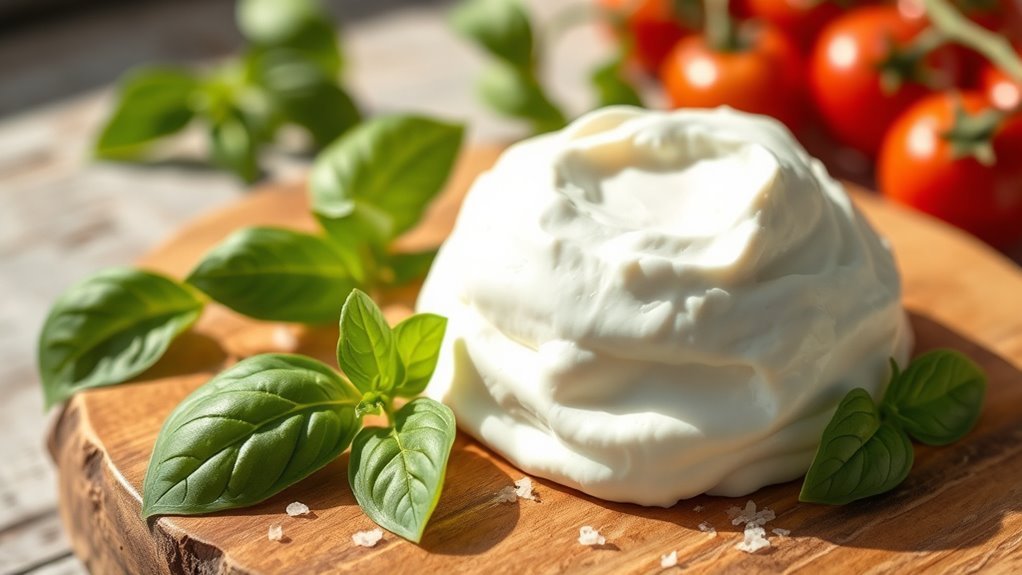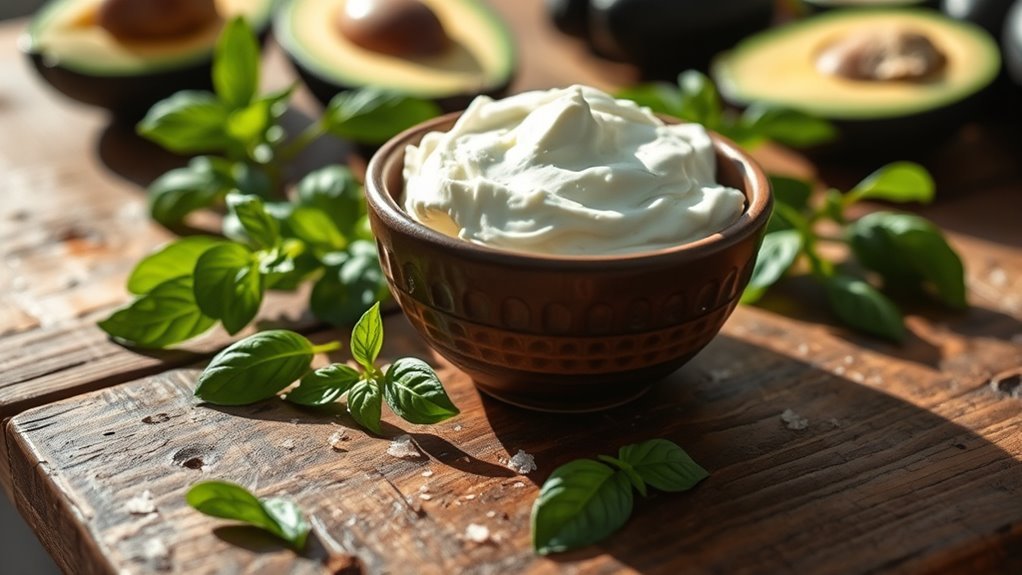Yes, ricotta cheese can be keto-friendly due to its relatively low carbohydrate content, with about 6 grams per half-cup serving. It’s also packed with protein and calcium, which can help with satiety and bone health. However, be mindful of portion sizes, as it has a higher carb count than hard cheeses. If you’re curious about ways to easily incorporate ricotta into your meals and its health benefits, there’s more valuable information to explore.
Nutritional Profile of Ricotta Cheese

Ricotta cheese, often celebrated for its creamy texture, is a versatile dairy product that can fit into various diets, including keto. Its origins trace back to Italy, where it was traditionally made from the whey of cow, goat, or sheep milk. You’ll find several ricotta varieties, each offering unique flavors and textures, such as whole milk, part-skim, and lactose-free options. Nutritionally, ricotta provides a good source of protein and calcium, making it an excellent choice for those seeking to increase their dietary intake. The balance of fats and proteins in ricotta can help keep you satiated, offering freedom in meal planning while still adhering to your nutritional goals.
Carb Content in Ricotta Cheese

When considering ricotta cheese for a keto diet, it’s important to look at its carb content. Typically, one cup of ricotta contains around 6-8 grams of carbohydrates, which can vary slightly based on the brand and preparation method. Comparing this to other cheeses, ricotta is relatively low in carbs, making it a potential option for your low-carb meals.
Ricotta Cheese Nutrition Facts
Cheese lovers often wonder about the nutritional profile of ricotta, especially its carbohydrate content, which is essential for those following a keto diet. Ricotta, with origins tracing back to Italy, comes in various ricotta varieties, each offering unique flavors and textures. On average, a half-cup serving of ricotta cheese contains about 6 grams of carbohydrates, making it a relatively low-carb option. While it provides essential nutrients like protein and calcium, it’s important to monitor portion sizes to stay within keto guidelines. When choosing ricotta, consider opting for whole-milk versions for better fat content, aligning with your dietary needs. Understanding these nutrition facts can help you enjoy ricotta while maintaining your desired lifestyle.
Carb Count Comparison
Although many cheese options are available, understanding the carb content in ricotta cheese can help you make informed choices on a keto diet. Ricotta cheese typically contains about 6 grams of carbs per half-cup serving, making it a moderate option among dairy products. When comparing it to other carb sources, such as cottage cheese or cream cheese, ricotta leans towards the higher end. If you’re looking for keto substitutes, consider cream cheese or mozzarella, which have lower carb counts. Balancing your choices is essential; while ricotta can fit into your diet, moderation is key. By being aware of the carb content, you can enjoy ricotta while still adhering to your ketogenic lifestyle.
Health Benefits of Ricotta on Keto

Ricotta offers a range of health benefits that can complement a ketogenic diet. Incorporating this creamy cheese can enhance your overall well-being while enjoying keto advantages. Here are three key health benefits:
- High in Protein: Ricotta is rich in protein, which helps in muscle maintenance and satiety, keeping you full longer.
- Calcium Source: It provides a good amount of calcium, essential for bone health and preventing osteoporosis, especially important on a low-carb diet.
- Low in Carbs: With its relatively low carbohydrate content, ricotta fits seamlessly into your keto lifestyle, allowing you to enjoy it without guilt.
How to Incorporate Ricotta Into Your Keto Diet
Incorporating ricotta into your keto diet can be both delicious and versatile. You can try various ricotta recipes, like creamy keto pancakes or savory stuffed peppers, while also pairing it with low-carb foods such as zucchini noodles or fresh vegetables. These combinations not only enhance flavor but also help you stay within your carb limits.
Ricotta Recipes for Keto
When you’re following a keto diet, finding versatile ingredients that fit your nutritional needs can be a game-changer. Ricotta cheese is a fantastic option, allowing you to create both sweet and savory dishes without sacrificing flavor. Here are three delicious ways to incorporate ricotta into your meals:
- Savory Ricotta Stuffed Peppers: Fill bell peppers with a mixture of ricotta, spinach, and spices, then bake for a tasty, low-carb meal.
- Ricotta Desserts: Whip ricotta with a touch of vanilla and a keto-friendly sweetener for a delightful dessert that satisfies your sweet tooth.
- Ricotta Pancakes: Combine ricotta with almond flour and eggs for fluffy, low-carb pancakes that can be enjoyed any time of day.
Enjoy experimenting with these recipes!
Pairings With Low-Carb Foods
While maneuvering a keto diet, finding compatible pairings for ricotta cheese can enhance both flavor and nutritional value. You can elevate your meals by adding low-carb toppings, like fresh basil, spinach, or a sprinkle of crushed red pepper. Consider using ricotta as a creamy filling for zucchini boats or stuffed mushrooms, blending it with herbs for an extra kick. Additionally, pairing ricotta with berries—like strawberries or raspberries—provides a delightful contrast, keeping your carb count in check. If you’re in the mood for something savory, try it with roasted bell peppers or as a dip with celery sticks. These ricotta pairings not only satisfy your cravings but also align perfectly with your keto lifestyle. Enjoy the freedom of creativity!
Ricotta Cheese Vs Other Cheeses on Keto
Although ricotta cheese can be a delicious addition to a keto diet, it’s essential to compare it with other cheeses to determine its overall suitability. Here are some key points to reflect on when evaluating ricotta against other cheese varieties:
- Carbohydrate Content: Ricotta has more carbs than hard cheeses like cheddar or parmesan, making those options more keto-friendly.
- Fat Composition: Ricotta is lower in fat compared to cream cheese or mascarpone, which can be better for those seeking higher fat intake.
- Protein Levels: Ricotta offers a decent protein source, but cheeses like mozzarella might provide a better balance of protein and fat for your keto goals.
If you’re exploring ricotta alternatives, keep these comparisons in mind to make informed choices on your keto journey.
Recipes Featuring Ricotta Cheese for Keto
Ricotta cheese can be a versatile ingredient in a keto diet, adding creaminess and flavor to a variety of dishes. You can enjoy both savory and sweet options that fit your low-carb lifestyle. Here are some recipe ideas to inspire you:
| Recipe Type | Description | Ingredients |
|---|---|---|
| Savory Ricotta | Spinach and Ricotta Stuffed Peppers | Bell peppers, spinach, ricotta, garlic |
| Ricotta Dessert | Keto Ricotta Cheesecake | Almond flour, ricotta, eggs, erythritol |
| Savory Ricotta | Herb and Ricotta Dip | Ricotta, fresh herbs, olive oil |
These recipes showcase ricotta’s versatility, allowing you to indulge in delicious meals while staying true to your keto goals. Enjoy experimenting in the kitchen!
Portion Control and Serving Sizes
Understanding portion control and serving sizes is essential for anyone following a keto diet, especially when incorporating ingredients like ricotta cheese. This creamy delight can fit into your meals, but it’s important to be mindful of how much you’re consuming.
Here are three tips for managing portion control with ricotta:
- Recommended Serving Size: Aim for about 1/4 cup (or 60 grams) to stay within keto guidelines.
- Track Your Intake: Use a food diary or app to monitor your ricotta consumption throughout the day.
- Pair Wisely: Combine ricotta with low-carb veggies or proteins to enhance flavor while controlling your overall carb intake.
Potential Drawbacks of Ricotta on a Keto Diet
While ricotta cheese can be a tasty addition to your keto meals, it’s important to recognize some potential drawbacks. One concern is lactose intolerance, which affects many individuals. If you’re lactose intolerant, enjoying ricotta could lead to digestive issues.
Here’s a quick overview of the health risks associated with ricotta:
| Health Risks | Details |
|---|---|
| Lactose Intolerance | May cause bloating and discomfort |
| High in Carbs | Can impact ketosis if overconsumed |
| Sodium Content | Excessive intake may affect blood pressure |
In moderation, ricotta can fit into your diet, but be mindful of these factors to maintain your keto lifestyle while ensuring your health remains a priority.
Frequently Asked Questions about Ricotta Cheese and Keto
1. Is ricotta cheese low in carbs suitable for a keto diet?
Yes, ricotta cheese can be a suitable option for a keto diet as it is relatively low in carbohydrates compared to other cheeses. A typical serving of ricotta cheese (about 1/2 cup) contains approximately 6-7 grams of carbs, which can fit into the daily carb limit for a keto diet, usually set around 20-50 grams of net carbs per day, depending on individual goals.
2. What are the nutritional benefits of ricotta cheese on a keto diet?
Ricotta cheese is rich in protein, calcium, and essential vitamins, making it a nutritious addition to a keto diet. It contains about 14 grams of protein per 1/2 cup serving, which can help in muscle maintenance and growth. Additionally, the calcium content supports bone health, and its versatility allows for incorporation into both sweet and savory keto recipes.
3. Can I use ricotta cheese in keto recipes?
Absolutely! Ricotta cheese can be used in a variety of keto recipes. It works well in casseroles, as a filling for keto-friendly pasta alternatives, or in desserts like keto ricotta pancakes and cheesecakes. Its creamy texture and mild flavor make it a great base for both savory and sweet dishes, enhancing the overall taste while keeping the carb count low.
4. Is whole-milk ricotta cheese better for keto than part-skim?
Whole-milk ricotta cheese is generally higher in fat content than part-skim ricotta, which can be beneficial for those on a keto diet that emphasizes high-fat intake. The higher fat content can help keep you satiated longer and provide essential fatty acids. However, both types can fit into a keto diet; the choice depends on individual dietary preferences and macronutrient goals.
5. Are there any potential downsides to eating ricotta cheese on keto?
While ricotta cheese can be a healthy addition to a keto diet, it is important to consume it in moderation. Some individuals may be lactose intolerant or sensitive to dairy, which could lead to digestive discomfort. Additionally, ricotta cheese can be calorie-dense, so those monitoring their calorie intake should account for it in their overall daily consumption. As always, it’s best to consult with a healthcare provider or nutritionist when making significant dietary changes.
References
- https://www.healthline.com/nutrition/keto-diet-foods#dairy
- https://www.webmd.com/diet/what-is-keto-diet
- https://www.ncbi.nlm.nih.gov/pmc/articles/PMC7071364/
- https://www.thekitchn.com/how-to-eat-cheese-on-a-keto-diet-22917425
- https://www.verywellfit.com/what-is-keto-cheese-5196451
- https://www.dietdoctor.com/low-carb/keto/what-is-keto
- https://www.foodnetwork.com/how-to/articles/what-is-the-keto-diet
- https://www.health.harvard.edu/blog/the-keto-diet-what-you-need-to-know-2019081117472


